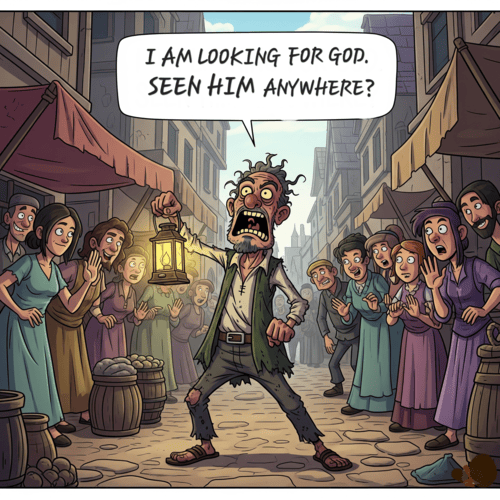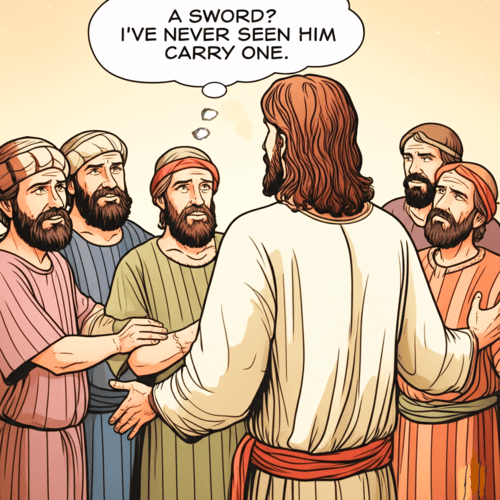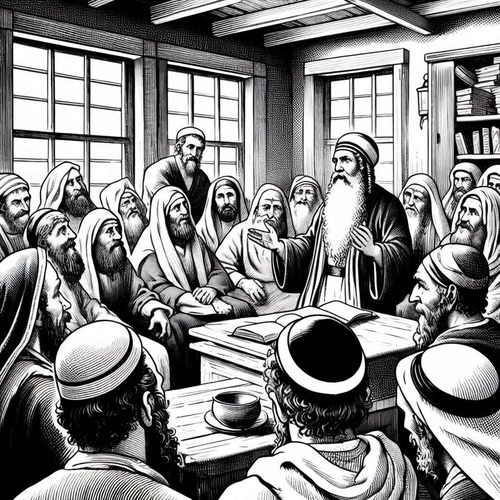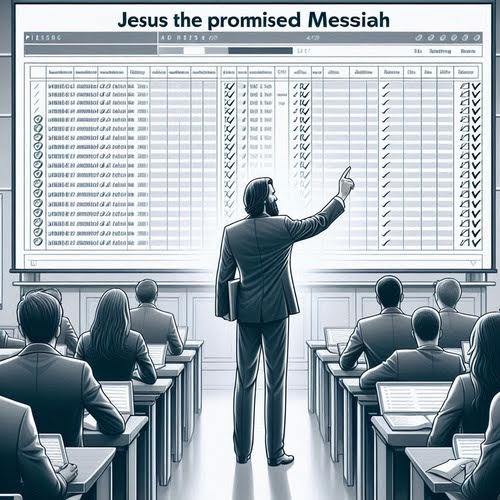No Hope Without It: Why Christ’s Active Obedience Matters
WHY CHRIST’S LIFE MATTERS AS MUCH AS HIS DEATH…
In January 1937, as J Gresham Machen lay dying in a North Dakota hotel room, the legendary Princeton theologian penned his final telegram to a friend: “I’M SO THANKFUL FOR THE ACTIVE OBEDIENCE OF CHRIST. NO HOPE WITHOUT IT.” These weren’t the rambling words of a feverish mind, but the crystallised conviction of a brilliant scholar who’d spent his life defending the gospel. Why would a dying man focus on this one doctrine? Because Machen understood something many Christians miss: Jesus didn’t just die for us—He lived for us too. And without that perfect life, we’d have no hope at all.
TWO SIDES OF ONE COIN: UNDERSTANDING CHRIST’S COMPLETE WORK
To grasp why Machen was so grateful, we need to understand what theologians call Christ’s double work. Think of it as two sides of the same coin, each essential for our salvation.
Passive obedience refers to Christ’s suffering and death on the cross. Here, Jesus passively received the punishment we deserved for our sins. This is what most Christians readily understand when they hear “Jesus died for my sins.” His death removes our guilt and condemnation, satisfying God’s justice. As Romans 8:1 declares, “There is therefore now no condemnation for those who are in Christ Jesus.”
Active obedience, however, refers to Christ’s perfect life of obedience to God’s law from birth to death. For 33 years, Jesus actively obeyed every commandment, fulfilled every requirement, and lived the sinless life that God demands. This wasn’t just preparation for the cross—it was part of His saving work. His perfect obedience earns the righteousness we need but could never achieve ourselves.
Here’s why Machen emphasised the “active” part: many Christians focus exclusively on Christ’s death while overlooking His life. But death alone only removes the penalty for sin—it doesn’t provide the positive righteousness God requires for eternal life. Without Christ’s active obedience, we’d be like pardoned criminals: forgiven but not righteous, acquitted but not accepted as beloved children.
THE BIBLICAL FOUNDATION: WHAT SCRIPTURE TEACHES
The Bible presents both aspects of Christ’s work as equally necessary for our complete salvation. Consider these key passages that reveal the double nature of our Saviour’s work:
The Great Exchange (Romans 5:18-19): This passage reveals the two-fold transaction: Adam’s disobedience made us sinners, but Christ’s complete obedience—not just His death but His entire life—makes us righteous before God.
Becoming Our Righteousness (2 Corinthians 5:21): Notice the double exchange here: our sin was placed on Christ (dealt with by His passive obedience), while His righteousness becomes ours (provided by His active obedience). We don’t just receive forgiveness; we receive Christ’s perfect standing before the Father.
Fulfilling All Righteousness (Matthew 3:15): When John the Baptist hesitated to baptise Jesus, Christ insisted it was necessary “to fulfil all righteousness.” From the very beginning of His ministry, Jesus was actively fulfilling the righteous requirements that we could never meet. Every act of obedience was credited to our account.
Born Under Law to Redeem (Galatians 4:4-5): Paul explains God sent His Son “born under the law, to redeem those who were under the law.” Christ didn’t just pay law’s penalty; He perfectly kept its demands on our behalf. The law required both perfect obedience and payment for disobedience—Jesus provided both.
Obedient to Death (Philippians 2:8): Paul describes Christ as “obedient to the point of death, even death on a cross.” His obedience wasn’t limited to the cross but characterised His entire earthly life, culminating in His ultimate sacrifice. Every moment of His life added to the treasury of righteousness that becomes ours through faith.
THE REFORMED TRADITION: BUILDING ON BIBLICAL TRUTH
John Calvin, the Reformer, grasped this truth clearly in his Institutes of the Christian Religion (2:16:5). Calvin writes Christ “had to show himself obedient to his Father throughout the whole course of his life.” For Calvin, salvation required not just Christ’s death but His entire life of perfect submission to God’s will. This righteousness, earned through a lifetime of obedience, becomes ours through imputation—God credits Christ’s perfect record to our account.
The Westminster Confession of Faith declares Christ made “a perfect obedience and a sacrifice of himself” for our salvation. Louis Berkhof, the systematic theologian, emphasised we need not just the removal of guilt but the positive addition of righteousness that only Christ’s active obedience provides. John Murray distinguished between Christ’s two forms of obedience while insisting they form one unified work of salvation. RC Sproul captured it perfectly: “We need not only the removal of guilt but the addition of righteousness.”
Early church fathers focused primarily on Christ’s death, but the Reformers recovered the biblical emphasis on His complete work. They understood that imputed righteousness—the very heart of justification by faith—depends on Christ having earned righteousness through His active obedience.
WHY THIS DOCTRINE IS VITAL FOR EVERY BELIEVER
Understanding Christ’s active obedience isn’t just academic theology—it transforms how we understand our salvation and relationship with God. Here’s why this doctrine matters so much:
- It Addresses Our Complete Need: God doesn’t just require the absence of sin; He demands perfect righteousness. As Jesus said, “Be perfect, therefore, as your heavenly Father is perfect” (Matthew 5:48). We’re not just guilty criminals who need pardoning—we’re spiritually bankrupt people who need righteousness.
- It Provides Unshakeable Assurance: Our confidence before God rests not just on forgiveness but on Christ’s flawless performance. When Satan accuses or conscience condemns, we can point not only to the cross that paid for our sins but to the perfect life that earned our righteousness.
- It Frees Us from Performance-Based Religion: Knowing that Christ has already earned perfect righteousness liberates us from the crushing burden of trying to make ourselves acceptable to God. We’re clothed in Christ’s perfect righteousness, already fully accepted and beloved.
- It Clarifies the Complete Gospel: The good news isn’t just “Jesus died for you” but “Jesus lived and died for you.” This complete substitution addresses our complete need.
- It Reveals the Depth of God’s Love: The Father didn’t just send His Son to die but to live 33 years of perfect obedience under the law’s demands. Every temptation resisted, every commandment obeyed, every moment of perfect submission was part of God’s loving plan to save us completely.
NO HOPE WITHOUT IT
As Machen faced eternity, he didn’t find comfort merely in Christ’s death—crucial as that was—but in His complete work of salvation. The cross that bore our sins was precious, but so was the perfect life that earned our righteousness. Both together secure our complete salvation.
This is vital truth that should fill every believer’s heart with gratitude. Our hope rests not merely on a death that removes penalty, but on a life that provides righteousness. Christ didn’t just pay our debt; He filled our spiritual bank account with His perfect obedience.
With Machen, every Christian can face life and death with confidence: “I’m so thankful for the active obedience of Christ. No hope without it.”
WHY CHRIST’S ACTIVE OBEDIENCE MATTERS: RELATED FAQs
Did the Reformers invent the doctrine of active obedience, or does it have earlier roots? While the Reformers developed and systematised this doctrine, its roots trace back to early church fathers like Irenaeus, who spoke of Christ “recapitulating” human life and succeeding where Adam failed. However, medieval theology largely focused on Christ’s death as satisfaction for sin, leaving the Reformers to recover the biblical emphasis on His complete obedience as essential for our righteousness.
- How do other Reformed scholars view active obedience? John Owen argued Christ’s active obedience was absolutely necessary because God’s law demands perfect conformity, not just penalty-payment. Charles Hodge emphasised justification requires both the non-imputation of sin (through passive obedience) and the imputation of righteousness (through active obedience). More recently, John Piper has stressed Christ’s active obedience provides the “blood-bought perfection” that enables our eternal joy in God’s presence.
- What about Christ’s temptations—how do they relate to His active obedience? Christ’s temptations were crucial tests of His active obedience, demonstrating He truly earned righteousness under the same conditions we face. Unlike the first Adam who fell to temptation in paradise, the second Adam resisted temptation in the wilderness and throughout His earthly life. Each victory over temptation added to the treasury of righteousness that becomes ours through faith.
How does active obedience relate to Christ’s roles as Prophet, Priest, and King? Christ’s active obedience spans all three offices. As Prophet, He perfectly proclaimed God’s truth; as Priest, He lived the holy life required of one who would offer sacrifice; as King, He perfectly submitted to the Father’s will, modelling the obedience His kingdom requires. His active obedience wasn’t separate from these roles but integral to fulfilling them perfectly on our behalf.
- Why don’t some Protestant traditions emphasize active obedience as strongly as Reformed theology does? Some Lutheran traditions, while affirming Christ’s perfect life, focus more heavily on His passive obedience as the primary ground of justification. Certain evangelical traditions emphasise personal relationship with Christ over the legal categories that make active obedience significant. However, Reformed theology insists that without Christ’s earned righteousness through active obedience, we would lack the positive legal standing before God that justification requires.
- How does understanding active obedience affect our view of sanctification? Knowing that Christ has already earned perfect righteousness frees us from trying to contribute to our justification through good works. Sanctification becomes grateful response rather than desperate effort to gain acceptance. We pursue holiness not to earn God’s favour (Christ’s active obedience has already done that) but because we’re already fully accepted and want to become what we already are in Christ.
What did Reformed scholars like Francis Turretin contribute to this doctrine? Turretin argued active obedience was absolutely necessary because the law’s demands are twofold: “do this and live” requires perfect performance, while “the soul that sins shall die” demands punishment for failure. He insisted Christ’s passive obedience alone could only remove condemnation but never provide the positive righteousness necessary for eternal life. His detailed work helped establish active obedience as essential Reformed orthodoxy for generations of theologians.
WHY CHRIST’S ACTIVE OBEDIENCE MATTERS: OUR RELATED POSTS
Editor's Pick

Is Occam’s Razor a Compelling Argument Against Theism?
WHY THE ARGUMENT ACTUALLY POINTS TO GOD Picture this: You're in a coffee shop debate with a confident sceptic [...]

Is the Doctrine of Justification in the Old Testament?
WAS PAUL INVENTING SOMETHING NEW OR REVEALING SOMETHING ANCIENT? Picture this scene: You’re discussing faith with a thoughtful sceptic who [...]

How God Reveals Himself to Us: General and Special Revelation
Every human heart carries an undeniable longing to know ultimate truth—to understand our place in the universe and the longing [...]

Doctrine of God and Bible Interpretation: Are The Two Connected?
Picture this: Two seasoned pastors read the same verse about God's sovereignty and human responsibility. One concludes God determines all [...]

What Did Jesus Mean: ‘I Bring Not Peace But a Sword’?
Jesus’ statement may sound perplexing to us at first read: "Do not think that I have come to bring peace [...]

The Beatitudes: The Nine Marks of Those Jesus Calls Blessed
When Jesus climbed that hillside in Galilee and began to speak, He turned the world's understanding of blessing upside down. [...]

Sacred Sorrow: Why Jesus Calls Mourning a Blessing
MAKING SENSE OF THE DIVINE PARADOX IN MATTHEW 5:4 When Jesus declared, “Blessed are those who mourn, for they will [...]

‘Sell Everything You Have…’: Are We To Do So Literally?
When Jesus encountered the rich young ruler in Matthew 19:21, His words cut through with startling clarity: “If you want [...]

Why Jesus Said ‘It’s Better I Go Away’…
THE SUPERIOR GIFT OF THE HOLY SPIRIT “Nevertheless, I tell you the truth: it is to your advantage that I [...]

What About Those Who’ve Never Heard the Gospel?…
WILL GOD SHOW THEM MERCY ON JUDGEMENT DAY? Few questions tug at the Christian’s heart like this one. Picture the [...]
SUPPORT US:
Feel the Holy Spirit's gentle nudge to partner with us?
Donate Online:
Account Name: TRUTHS TO DIE FOR FOUNDATION
Account Number: 10243565459
Bank IFSC: IDFB0043391
Bank Name: IDFC FIRST BANK






